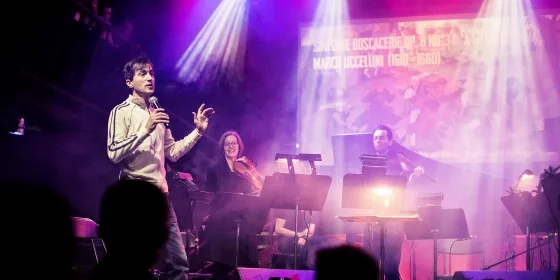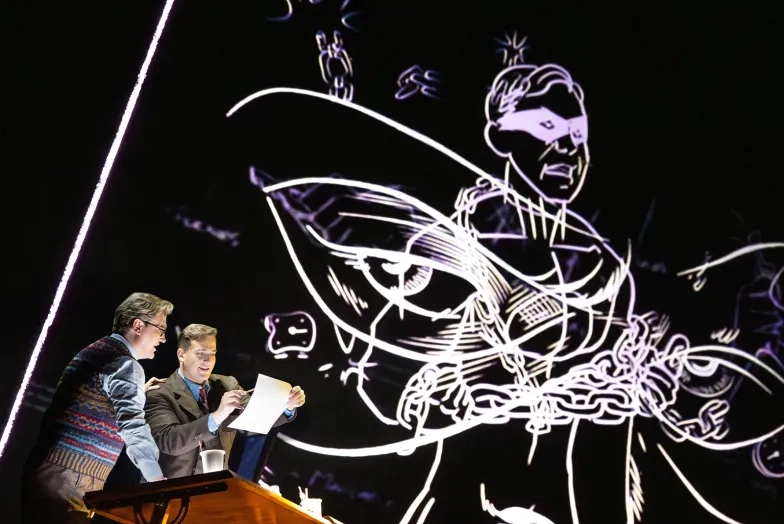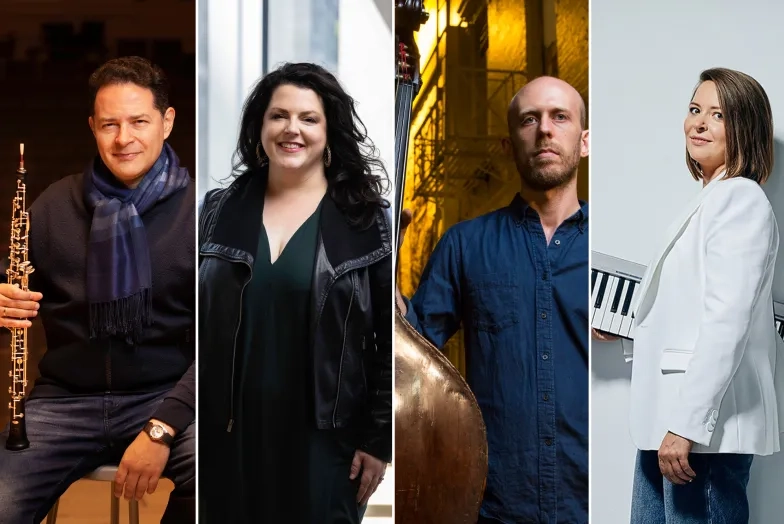How to Launch a Musical Startup
News StorySince 2008, Mercury Soul has combined classical music with electronica, attracting audiences from across the musical spectrum that look for new and engaging ways to experience music. Co-founded by SFCM faculty member Mason Bates (aka DJ Masonic), it invites a sense of “now” in the classical sphere and adds a flavorful element to the club scene that doesn’t typically see live musicians on stage.
While Mercury Soul has succeeded in selling out shows and developing its own followers—people who have attended events in multiple cities—it started out as any small operation. As a nonprofit, Mercury Soul benefits from philanthropists whose interests align with the organization’s mission. With a few gutsy musical entrepreneurs and interest from donors like Keith Geeslin (president of the San Francisco Opera Association), Mercury Soul took off to be the premier classical-club crossover event series in the country.
Faculty member Mason Bates and alumnus Marko Bajzer ’15 (Mercury Soul’s general manager) laid out a plan for beginning a nonprofit musical startup. Take it from them in their own words below and see how the spark of an idea can become a national hit.
1. Develop an Idea
What unique interests do you have that you can combine into something that's fresh and interesting? Who is your target audience? Has this (or have components of this) been done before? If so, what can be learned from that? Is the market for this under- or over-saturated already?
2. Create a Budget
Itemize all of your expenses and estimate your income from various sources. Identify things in your budget that are more "if we had all the money in the world" items versus "absolutely necessary" items. If you're not sure what it's supposed to look like, there are lots of different templates you can find online.
3. Find Partners and a Date
This includes key musicians, other artists, and venues. This is why it's crucial to be social and make friends while you're in school because, after school, your friends suddenly become your potential artistic and business partners. They're the people that get you gigs, come to your shows, donate to your endeavors, like your social media posts, and give you moral support. It's also important to be going out and keeping your finger on the pulse of what's happening in your community. You won't be exposed to venues, observing audiences, or finding inspiration from others if you're stuck in a practice room all day. A great resource for finding venues around San Francisco is www.bayareaspaces.org. Once you have a date, put a hold on the venue. It's critical that your venue is a place where your target audience is used to going and is comfortable going.
4. Raise Money
Money in the arts world generally comes from a combination of grants, donations, and earned income (mostly ticket sales, though it can also include things like merchandise). For most classical music nonprofits, about 25-50% of their income comes from ticket sales. Crowdfunding campaigns are a great way to ask family and friends for money in a way that is less awkward than calling them up and just asking. Putting together a slick campaign with great video and imagery shows them that you're putting work into this and are committed to making it happen. SFCM's Professional Development and Engagement Center has great resources for fundraising.
Mercury Soul board member Keith Geeslin adds: "As for grants from foundations and donations from individual philanthropists, do some research up front to make your efforts more efficient. Just because an organization or individual has a history of funding classical music doesn’t mean that they will be interested in your project. Look for funders who have supported similar efforts to yours, preferably with a history of supporting new ideas and organizations."
5. Confirm the Venue and Book Any Remaining Partners
Once you have some money in the coffers, fill in any gaps relating to artists, graphic designers, stage managers, box office, sound engineers, etc. and put down a deposit for a venue (if necessary). Also, book people who will be able to document this—photographers, videographers, and/or audio recording engineers. If music happens in a concert venue and no one is around to post it on social media, did it make a sound?
6. Promote the Event
Write a press release, pitch to any relevant media for editorials or calendar listings, create signs and posters, activate social media and email lists, and tell everyone you know about it. This is where knowing your target audience is important—who are they, how do they receive information, and what factors into their decision as to what kind of events they attend? It's really demoralizing to have put a lot of effort into something and then not have anyone show up. Engage and inspire your artistic partners and venue to promote as well.
7. Execute the Event
This is the moment you’ve been waiting for! Arrive extra early to the venue and make sure you have ample time to set everything up and test all of the technology. There will inevitably be last minute surprises like heavy furniture that needs to be moved, noisy fans that no one seems to know how to turn off, or suddenly faulty equipment. Give yourself more time than you think you need.
8. Follow Up
Pay musicians, thank the donors (written cards go a long way, as well as some kind of memento, like a recording or a nice poster), get the email addresses of the attendees from the venue or whoever processed the tickets, thank everyone for coming, and post pictures and video to social media!



